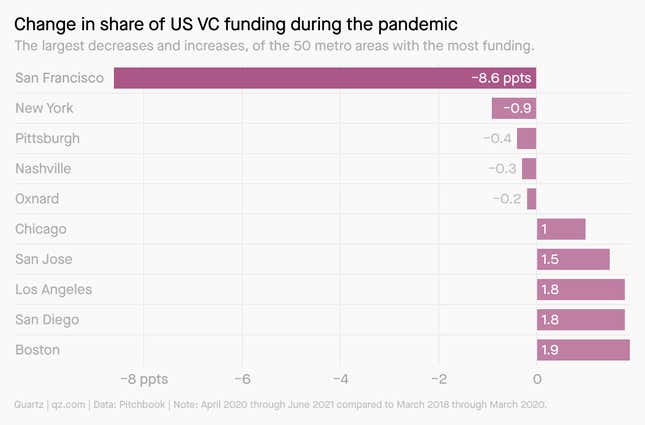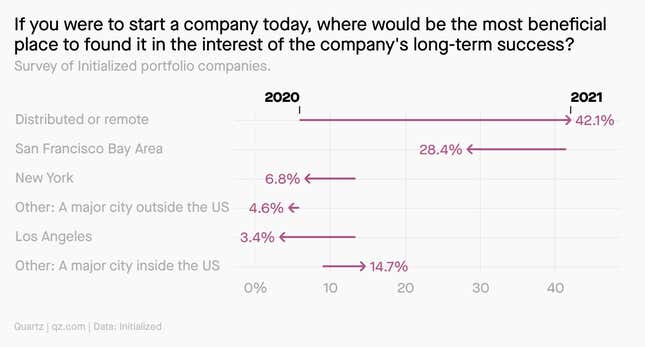
Hi Quartz members,
Silicon Valley is still, indisputably, the global capital for tech startups—no other region comes close. But it is less dominant than it used to be. Slowly but surely, venture capital funding has been spreading around the world. And when the pandemic hit, a number of investors and entrepreneurs took the opportunity to publicly announce that they were leaving the Valley and did not intend to return.
A year-and-a-half later, the data confirm that the Bay Area has lost ground in terms of its share of VC funding. But the cities that gained aren’t necessarily the ones VCs have been hyping on Twitter. And even as remote work has become ubiquitous in tech, startup activity has remained concentrated in major cities. The question is whether that clustering—once considered gospel among economists—will continue. The answer will help determine how the global economy is structured, which workers can get high-paying jobs, and whether the tech industry can finally diversify.
Gotta go
Before the pandemic, many investors and startup founders had already grown disillusioned with San Francisco—an expensive, stratified city where anyone who wasn’t in tech seemed to hate tech. When Silicon Valley locked down, some saw an opportunity to pack up and leave.
- Remote work arrived ahead of schedule. Suddenly, investors and founders had the option to work from anywhere.
- Tech workers want to dodge taxes… California’s top marginal income tax rate for individuals is 13.3%. Up-and-coming tech hubs like Austin and Miami are in states with zero income tax—along with looser business regulations and lower costs of living.
- …and their neighbors. Many tech workers who have left San Francisco resent the criticism they’ve faced from local activist groups, the left-wing politics of their social circles, and the city’s sizable homeless population.
- Investors shed some of their geographic biases. As they’ve adapted to holding pitch meetings via Zoom, venture funds have become more willing to bankroll startups outside Silicon Valley.
THE WORLD IS STILL NOT FLAT
San Francisco saw more VC activity during the pandemic than it did before, as the rising tide of the tech boom lifted all boats. But its share of US VC funding has dropped from 36% to 27% since the pandemic hit the US, according to data from Pitchbook.

If startups are leaving San Francisco, however, they’re not necessarily going far. San Jose saw its share of VC go up during the pandemic; so did Sacramento. And the biggest winners during the pandemic were cities that were already tech hubs: Boston, L.A., San Diego, and Chicago.
While the US is still the biggest market for VC, its share of funding is considerably lower than a decade ago. Mumbai, Copenhagen, and Jakarta top the list of “emerging” startup ecosystems published by Startup Genome, a San Francisco-based research firm. These are cities not yet in the top 40 by the firm’s metrics but with substantial early-stage funding and highly-valued startups.
WHAT MAKES A CLUSTER?
Innovation has always been tied to geography. Textile mills clustered in Lowell, Massachusetts in the 1800s; Detroit was the hub of automobile innovation in the first half of the 20th century. In a 2020 paper, economists William Kerr and Frederic Robert-Nicoud catalogued the factors common to tech clusters throughout history:
🏙️ Size & diversity: People and ideas mix together more in dense places filled with people from different backgrounds. Size helps avoid dominance by a single industry, which can impede innovation.
🎓 Universities: Tech clusters depend on scientists and engineers, and so usually arise near research universities.
🌴 Quality of life: Tech workers tend to have options when it comes to where to live, since they’re typically well-educated and well-off. Places with good weather and lots to do have an edge.
🤞 Luck: Bill Gates and Paul Allen chose to move Microsoft from Albuquerque to Seattle because the latter was their hometown. “At the time, Albuquerque was considered the better place to live, it was favored by most of Microsoft’s early employees and the location of many early clients,” Kerr and Robert-Nicoud write. That bit of randomness changed tech geography forever.
THE REMOTE STARTUP
Remote work is not going away. But the next phase of remote work will be even more transformative than the one we’ve experienced over the last 18 months, says Adam Ozimek, a labor economist at Upwork, a freelance work platform.
Most remote workers aren’t confident that their company will eventually settle on a work-from-anywhere policy, so those who’ve moved during the pandemic haven’t gone far. But “that’s just the tip of the iceberg,” says Ozimek. He expects that as more companies clarify their long-term policies on remote work, more people will consider bigger moves. An Upwork survey of 20,000 Americans found that 42% are considering moving more than four hours by car from where they currently live.
That could upend the logic of the modern tech industry. “Once workers and businesses can connect wherever they are, that means you don’t have to locate your company in a superstar city in order to have access [to talent],” Ozimek told Quartz. He thinks the same logic will apply to raising money.
If remote work continues to spread out opportunities in tech, that could make it easier for the industry to diversify. Right now, high housing prices in places like San Francisco are a major barrier for some would-be tech workers and startup founders—especially those without the connections to fundraise remotely. “That’s a tax on growth,” says Ozimek. “I think we should be pretty excited to see startups be founded and scale outside of high-cost areas.”
PREDICTION 🔮
Kim Mai-Cutler, a partner at Initialized, a VC firm, and a former tech journalist, predicts that the heir to Silicon Valley won’t be a place at all:
“Post-pandemic, the Bay Area will be the second leading technology hub after the cloud. Pre-pandemic, the Bay Area was still the leading choice for our founders in terms of where to start a company. There were many other cities that were distant seconds or thirds including New York and Seattle. Post-pandemic is a different story. More than 40 percent of founders say that the best place to start a company will be in the cloud. We expect to see decentralized or remote companies displace venture-backed companies based in the Bay Area over time.”
Earlier this year, Mai-Cutler surveyed Initalized’s portfolio companies and reported that only 27% plan to have a primary office after the pandemic.

KEEP LEARNING
- Silicon Valley isn’t a place (Kim-Mai Cutler)
- The rest of the world is catching up to Silicon Valley (Quartz)
- How remote work is changing businesses forever (Upwork)
- Mumbai has the world’s top-ranked emerging startup ecosystem—again (Quartz)
- Why Silicon Valley is no longer the global model (Quartz)
- Tech says the Bay Area ‘demonized capitalism,’ but is Miami the solution? (San Francisco Chronicle)
SOUND OFF
If you were starting a company today, where would you locate it?
In last week’s poll about the feasibility of web3, 38% of respondents said wagmi (we’re all gonna make it). See you all on the decentralized web.
Have a great week,
—Walter Frick, executive editor (minored in geography)
—Nicolás Rivero, tech reporter (resident Miami expert)
ONE 💸 THING
Tech isn’t the only industry considering a move—banks are, too. But while techies are looking to Texas and Florida, banks that set up offices there years ago are wondering if they should leave.
